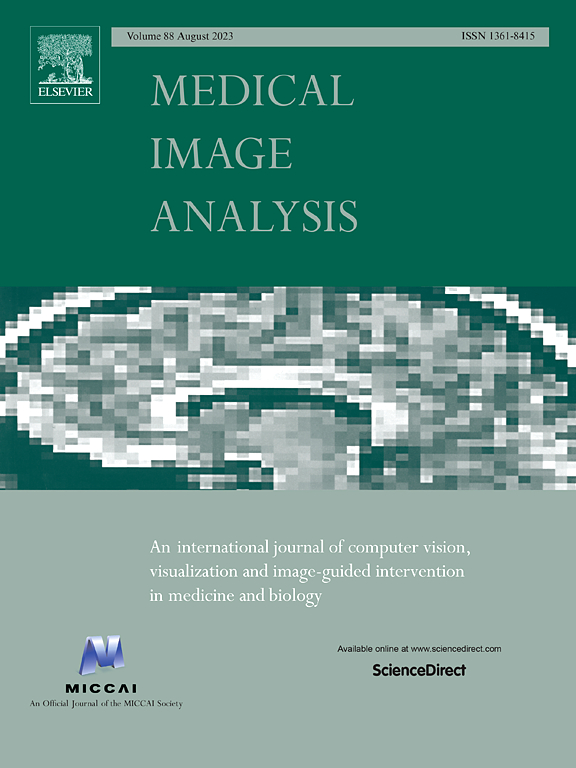One for multiple: Physics-informed synthetic data boosts generalizable deep learning for fast MRI reconstruction
IF 10.7
1区 医学
Q1 COMPUTER SCIENCE, ARTIFICIAL INTELLIGENCE
引用次数: 0
Abstract
Magnetic resonance imaging (MRI) is a widely used radiological modality renowned for its radiation-free, comprehensive insights into the human body, facilitating medical diagnoses. However, the drawback of prolonged scan times hinders its accessibility. The k-space undersampling offers a solution, yet the resultant artifacts necessitate meticulous removal during image reconstruction. Although deep learning (DL) has proven effective for fast MRI image reconstruction, its broader applicability across various imaging scenarios has been constrained. Challenges include the high cost and privacy restrictions associated with acquiring large-scale, diverse training data, coupled with the inherent difficulty of addressing mismatches between training and target data in existing DL methodologies. Here, we present a novel Physics-Informed Synthetic data learning Framework for fast MRI, called PISF. PISF marks a breakthrough by enabling generalizable DL for multi-scenario MRI reconstruction through a single trained model. Our approach separates the reconstruction of a 2D image into many 1D basic problems, commencing with 1D data synthesis to facilitate generalization. We demonstrate that training DL models on synthetic data, coupled with enhanced learning techniques, yields in vivo MRI reconstructions comparable to or surpassing those of models trained on matched realistic datasets, reducing the reliance on real-world MRI data by up to 96 %. With a single trained model, our PISF supports the high-quality reconstruction under 4 sampling patterns, 5 anatomies, 6 contrasts, 5 vendors, and 7 centers, exhibiting remarkable generalizability. Its adaptability to 2 neuro and 2 cardiovascular patient populations has been validated through evaluations by 10 experienced medical professionals. In summary, PISF presents a feasible and cost-effective way to significantly boost the widespread adoption of DL in various fast MRI applications.

一对多:物理信息合成数据促进了快速MRI重建的可推广深度学习
磁共振成像(MRI)是一种广泛使用的放射学方式,以其无辐射,全面了解人体,促进医学诊断而闻名。然而,长时间扫描的缺点阻碍了它的可访问性。k空间欠采样提供了一个解决方案,但由此产生的伪影需要在图像重建过程中细致地去除。尽管深度学习(DL)已被证明对快速MRI图像重建有效,但其在各种成像场景中的广泛适用性受到限制。挑战包括与获取大规模、多样化的训练数据相关的高成本和隐私限制,以及在现有DL方法中解决训练数据和目标数据之间不匹配的固有困难。在这里,我们提出了一种新的用于快速MRI的物理信息合成数据学习框架,称为PISF。PISF标志着通过单一训练模型实现多场景MRI重建的通用深度学习的突破。我们的方法将二维图像的重建分为许多一维基本问题,从一维数据合成开始,以促进泛化。我们证明,在合成数据上训练DL模型,再加上增强的学习技术,产生的体内MRI重建与在匹配的真实数据集上训练的模型相当或超过,将对真实MRI数据的依赖减少了96%。通过单一训练模型,PISF支持4种采样模式、5个解剖、6个对比、5个供应商和7个中心的高质量重建,具有显著的通用性。通过10名经验丰富的医疗专业人员的评估,验证了其对2种神经和2种心血管患者群体的适应性。综上所述,PISF提供了一种可行且具有成本效益的方法,可以显着促进DL在各种快速MRI应用中的广泛采用。
本文章由计算机程序翻译,如有差异,请以英文原文为准。
求助全文
约1分钟内获得全文
求助全文
来源期刊

Medical image analysis
工程技术-工程:生物医学
CiteScore
22.10
自引率
6.40%
发文量
309
审稿时长
6.6 months
期刊介绍:
Medical Image Analysis serves as a platform for sharing new research findings in the realm of medical and biological image analysis, with a focus on applications of computer vision, virtual reality, and robotics to biomedical imaging challenges. The journal prioritizes the publication of high-quality, original papers contributing to the fundamental science of processing, analyzing, and utilizing medical and biological images. It welcomes approaches utilizing biomedical image datasets across all spatial scales, from molecular/cellular imaging to tissue/organ imaging.
 求助内容:
求助内容: 应助结果提醒方式:
应助结果提醒方式:


